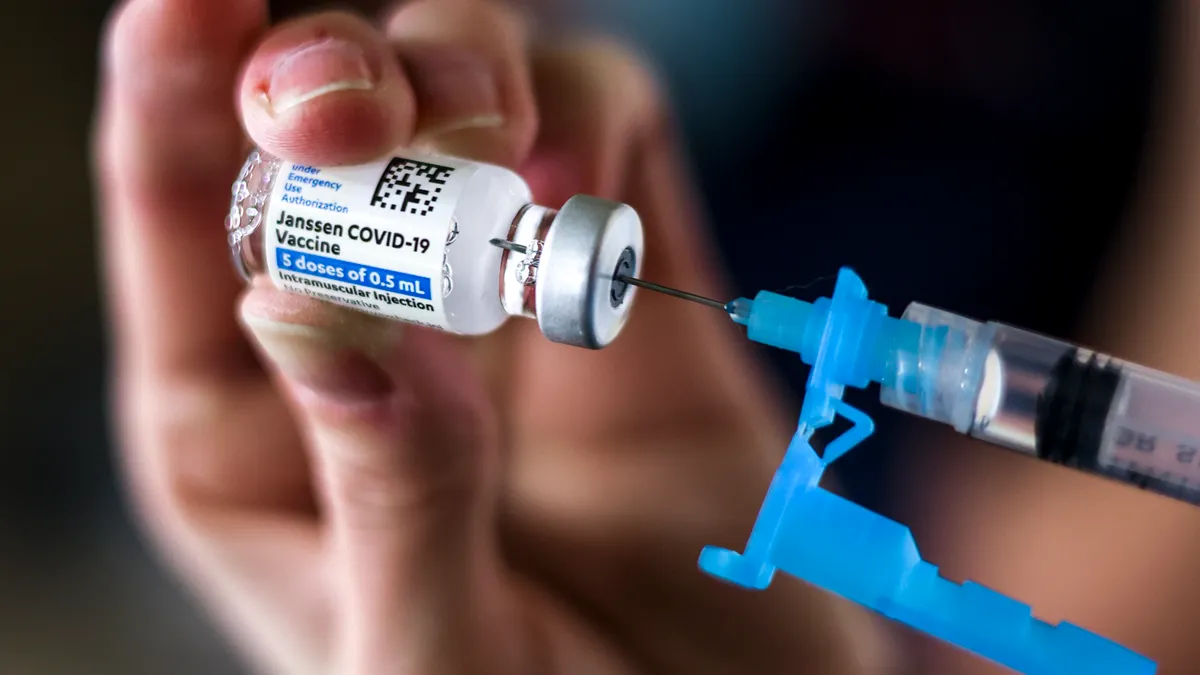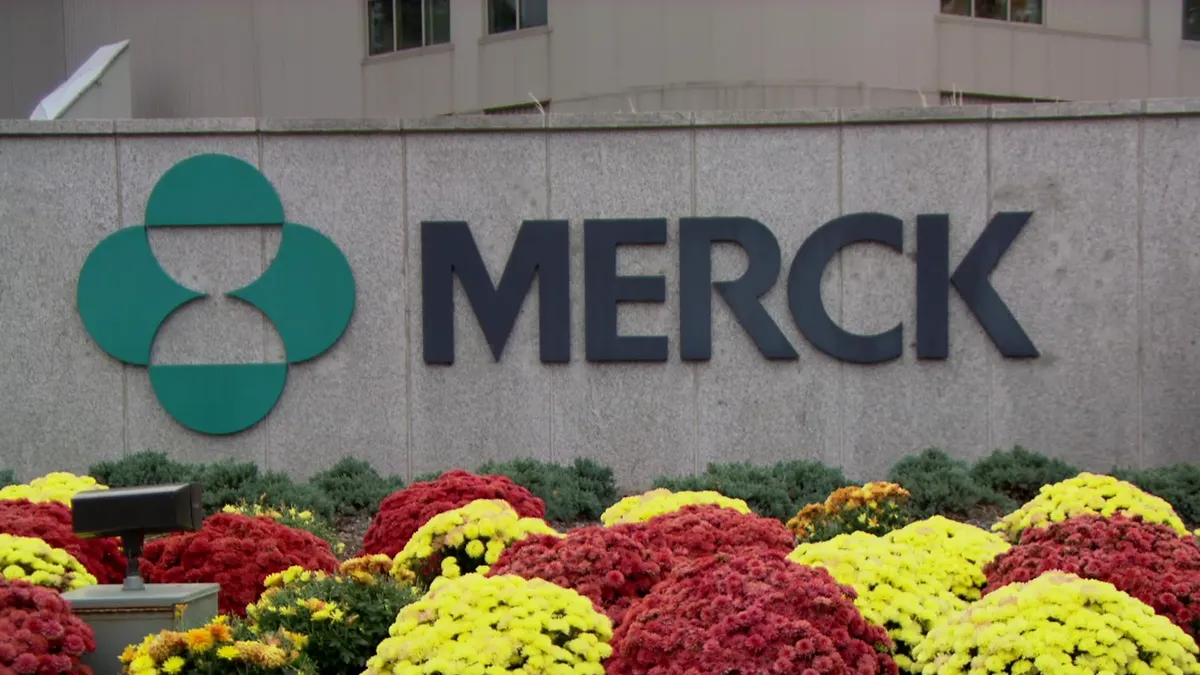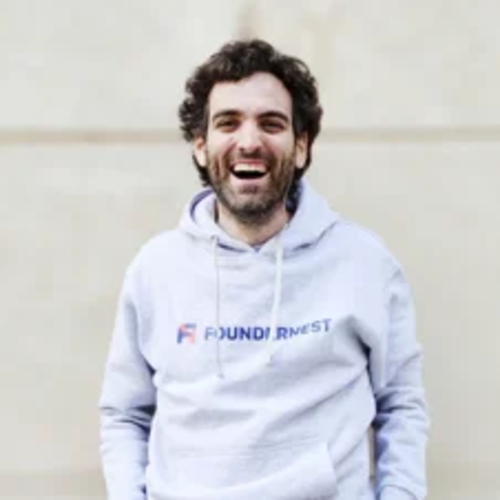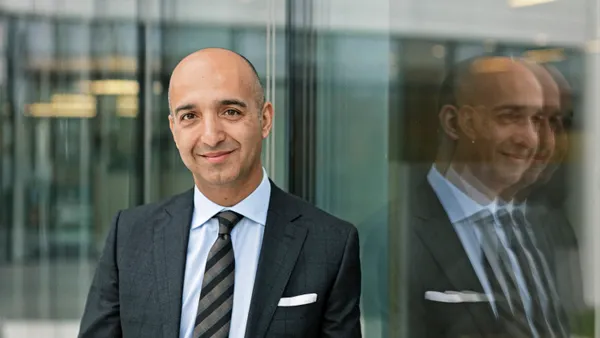Penny Heaton had only been head of the global vaccines therapeutic area at Janssen for a few weeks when she was thrust into the global spotlight of the COVID-19 discussion.
“Within three weeks of being here, we were preparing for the first FDA advisory meeting when the desire for boosters came up,” she says of her transition into the role at Johnson & Johnson’s pharmaceutical unit.
By mid-October, she was presenting data at that meeting, and a few days later, the agency issued an Emergency Use Authorization for a booster dose of the Johnson & Johnson COVID-19 vaccine.
It was a trial by fire, but Heaton was ready. Since joining Janssen in September, she continues to champion the company’s vaccine in the face of setbacks, like the FDA limiting its authorized use in May due to the vaccine’s risk of thrombosis with thrombocytopenia syndrome, which can cause potentially life-threatening blood clots. It was the latest in a string of challenges for J&J’s COVID-19 jab. In 2021, the FDA told J&J that 60 million doses of its shot would have to be tossed due to quality control issues at the company’s contract manufacturer, Emergent BioSolutions.
This year, sales of the shot have begun to tumble downward, coming in at $457 million in the first quarter — well below Wall Street projections of $785 million.
Still, Heaton says there are valuable lessons in the bigger picture aims of J&J’s COVID-19 approach — and that legacy is now propelling a wider vaccine strategy that could be felt on a global scale.
“I had been following the Janssen COVID-19 response for some time, and I was always really impressed — even before I ever knew I was going to join — about the view and the strategy of really having a vaccine for the world,” says Heaton.
The power of vaccines
The idea of “having a vaccine for the world” naturally appealed to Heaton, who has devoted her career to vaccine development and health equity. She spent eight years with the Bill & Melinda Gates Medical Research Institute, most recently as CEO. Her industry experience has been extensive as well, with more than 13 years clocked at companies like Merck & Co., where she chaired the team developing a rotavirus vaccine, and Novartis, where she supervised phase 3 studies and regulatory filings for its meningococcal meningitis vaccines Bexsero and Menveo. She cut her teeth in global health at the CDC, where she was an epidemic intelligence service officer.
In fact, it was Heaton’s work at the CDC, studying diarrheal diseases in infants born to HIV-infected mothers in Kenya, that sparked her passion and appreciation for the remarkable power of vaccines. During the study, she followed more than 400 infants from birth until two years of age — at the end of two years, 52 of them had died.
“It changes your perspective forever to see these sweet kids, who I had seen from the time they were born and followed at least every month, if not more frequently … become ill and never really recover from that,” she says.
“For me, it’s all about having impact, and the positive impact we can have on global health broadly with vaccines is just amazing.”

Penny Heaton
J&J (Janssen) vaccines global therapeutic head
Although the CDC could recommend healthcare measures like latrines, clean water and handwashing to prevent these illnesses, these options were often unavailable to those families.
“They couldn’t build a latrine; clean water was not an option for them,” Heaton says. “But when I thought about a vaccine, that was something that was very tangible and could have an immediate impact while their economies are emerging, and they’re building infrastructure and getting to the point where they could provide what they needed to keep children healthy and happy.”
Throughout her career, Heaton has seen vaccines change people’s lives.
“It’s an interesting concept because really what you’re looking at with vaccines is what doesn’t happen, rather than what does happen,” she says. “I’ve seen it in my lifetime over and over again.”
For instance, the rotavirus vaccine — the first one Heaton worked on — has dramatically reduced diarrheal disease deaths in children worldwide.
In the U.S., rotavirus was the main cause of severe diarrhea in infants before the vaccine was introduced in 2006, according to the CDC, leading to between 55,000 and 70,000 hospitalizations every year. Now, the situation is dramatically different.
“I talk to my pediatrician friends, and they say they don’t see rotavirus anymore. It’s gone from the hospitals. It's just remarkable,” Heaton says.
‘A geek from the very beginning’
Heaton’s interest in infectious diseases didn’t start with her work with the CDC or even while studying at the University of Louisville School of Medicine in Kentucky. It started when she was a little girl who was fascinated by the stories her father told of being ill with tuberculosis before she was born, and the chest X-ray that he showed her of the scarring on his lung. He told her that the germs in his chest were “asleep,” but if they “woke up” he could cough them out and make her sick.
“I know I probably should have been scared by that, but instead I was just more intrigued,” she says.
While other children might have been looking at pictures of fairy princesses or unicorns, Heaton combed through her family’s Encyclopedia Britannica for images of pathogens.
“I was a geek from the very beginning. I loved infectious diseases. I know that sounds really strange, but it’s almost like I had a gene for infectious diseases,” she explains. “I would find pictures of bacteria and mitochondria and enlarge them with the enlarger my mother had for her Sunday school class. I would get it and steal it and blow-up pictures of bacteria, and trace them and color them in.”
‘On the cusp of the golden age of vaccines’
Heaton’s enthusiasm hasn’t waned, especially now that she’s excited about so much of what Janssen is working on, much of which aims to address areas of unmet medical need.
“I feel like right now we’re on the cusp of the golden age of vaccines, and Janssen’s solutions-oriented approach to vaccine development and deployment builds on our legacy of lowering the burden of global health threats like COVID-19 and Ebola,” she said via email.
She points to the company’s respiratory syncytial virus (RSV) adult vaccine candidate and its phase 2b CYPRESS study, which showed that it was highly effective in protecting against three clinical definitions of lower respiratory tract disease caused by RSV, demonstrating efficacy of 70% to 80% in adults aged 65 and older.
“We’ll be filing that the latter part of this year,” Heaton says. “That’s a huge unmet medical need. It’s gone unrecognized in adults for so long.”
The company is also working to develop vaccines for antimicrobial-resistant pathogens and chronic infections like HIV and herpes simplex, the latter of which she says the company is building out.
“I won’t spill all of the beans before it gets fully approved,” she says. “But we’re in that process.”
It’s just the latest work in a career dedicated to global vaccine access and health.
“I love vaccines, so I want to be a leader in vaccines … I’m a little competitive as well,” she says. “For me, it’s all about having impact, and the positive impact we can have on global health broadly with vaccines is just amazing.”









